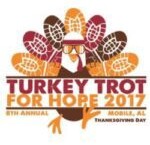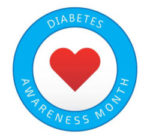4310-E Old Shell Road
Mobile,Alabama 36608
(Across from Springhill College)
Do You Have Your Doctor's Cell Phone Number?
Monthly Archives: November 2017
-

Turkey Trot for Hope & Gobble Wobble 2017 Benefiting Camp Rap-A-Hope
Posted on November 13, 2017The Turkey Trot for Hope will be held at Spanish Plaza in Downtown Mobile on Thanksgiving Day, November 23rd. The 5K will start at 8AM and the Gobble Wobble fun run will begin at 9AM.
Proceeds from the event will benefit Camp Rap-A-Hope, a camp for Gulf Coast children with cancer. Camp Rap-A-Hope’s programs are provided free of charge to the campers and their families. The camp is funded through generous donations from individuals, businesses, and foundations.
For more information and to register for the event please click here.
-

November Is Diabetes Awareness Month- What Is The Difference Between Glucose Level and Hemoglobin A1C?
Posted on November 9, 2017Diabetes is one of the leading causes of disability and death in the United States. It can cause heart disease, stroke, eye problems, nerve damage, kidney disease and other health problems if not controlled. The most common types of diabetes are type 1 and type 2. If you have type 1, your body does not make insulin. If you have type 2, your body does not make or use insulin well.
Diabetes affects one in four people over the age of 65 and millions more are at risk of developing type 2 diabetes. You can lower your risk of type 2 diabetes through diet, exercise, and healthy lifestyle changes. For more information click here.
Early detection and prevention are important. During your annual exams we perform two diabetic screening tests in your fasting lab work. The first is a fasting glucose level. This tells us what your blood sugar is that morning before you eat. We also test a Hemoglobin A1C level. This tests your average blood sugar level over the past three months and results in a range of normal, pre-diabetic, and diabetic. Please do not forget to schedule your annual exam and fasting lab work around the time of your membership renewal.
-
Is Your Phone or Tablet Keeping You Awake At Night?
Posted on November 1, 2017A common problem that I see many of my patients experience is trouble falling asleep at night. In a technology driven world, we tend to fall asleep with a phone or tablet in hand. Staying up late with your device can rob you of a good night’s sleep.
Multiple studies have shown that the blue light that is given off by electronics affects our sleep health by slowing or halting the production of melatonin, the hormone that signals our brain that it’s time for bed. Without melatonin, we stay awake later than intended.
The best solution is to eliminate night time phone or tablet sessions. But what do you do if you cannot give up a late night Netflix show, Facebook browsing, or book on your tablet or phone? Some phones and tablets, particularly Apple products, have a “Night Shift” option that turns off the blue light by using a warm orange-red filter on your screen. There are also apps available for download that can remove the blue light from your screen when you select to do so.
Despite eliminating blue light from your screens, some studies suggest that staring at any screen before bed, whether it is giving off blue light or not, can keep you awake longer. I suggest to put your phone or tablet away at least one hour before bed to help you get a more restful night of sleep.
